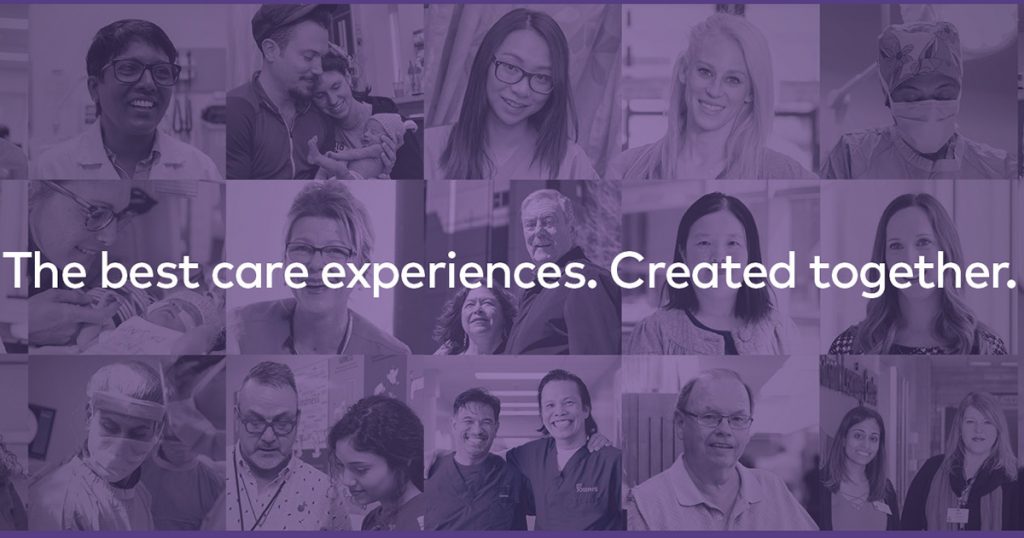How Patient and Family Partners are helping to make Unity Health Toronto’s vision a reality

By Jennifer Stranges
(December 11, 2020) – As a primary caregiver for both her late husband and her mother, who was a nurse over 30 years ago at St. Joseph’s Health Centre, Judi experienced first-hand how important family support can be for loved ones who are sick – especially those staying in the hospital.
Now as one of 130 Patient and Family Partners at Unity Health Toronto, Judi is using that experience to help shape the hospitals’ visitor policies during the pandemic.
“As a Patient and Family Partner, I am able to contribute that patient voice to policies and guidelines at Unity Health Toronto,” says Judi. “I am confident that voice is heard and considered, and I feel sincerely proud to be affiliated with this organization.”
Unity Health Toronto’s vision is “The best care experiences. Created together”, but achieving this vision can only be done in collaboration with patients and their families. Patient and Family Partners provide important perspective and diverse views to inform goals and initiatives, including but not limited to quality and safety priorities, policies and procedures, communication plans and educational resources.
Cathy O’Neill, Senior Director of Patient Experience and Community Engagement at Unity Health, says the network regularly engages Patient and Family Partners from all three sites, and that their input has been especially helpful to the network throughout the COVID-19 pandemic.
During the pandemic, a new Patient and Family Partner Think Tank was put in place to quickly address and provide feedback on COVID-19 related policies and initiatives to improve the patient experience. The group meets virtually every two weeks and have reviewed front entrance signage, provided feedback on public-facing information for patients and families and advised on how to continue engaging with Patient and Family Partners during the pandemic.
O’Neill says there have also been Patient and Family Partners Town Halls, led by Unity Health President and CEO Dr. Tim Rutledge, as well as a working group dedicated to advising on the Essential Care Partner visitation guidelines. Four Patient and Family Partners are an integral part of this working group along with staff from across all three sites.
A significant component of the Essential Care Partners guidelines is an appeals process. Judi is one of two Patient and Family Partners providing a patient-family voice on the Appeals Panel, which was developed to consider situations where the patient or Essential Care Partner believes that their situation merits a shift from current Family Presence Policies and Guidelines.
Visits from Essential Care Partners are important for a patients’ healing journey, but Judi acknowledges that the times we live in are anything but normal – and there is tremendous pressure to balance care needs and what is safe and feasible.
A voice like Judi’s on the Appeals Panel is a great example of what patient-centred care is all about, says O’Neill.
“We have two Patient and Family Partners who serve on the Appeals Panel, and I think that’s really important because it demonstrates we are honouring that we have to have a patient voice in most things we do.”
Another way Unity Health Toronto is working to create the best care experiences is by developing a Care Experience Institute, led by one of Unity Health’s vice-presidents, Dr. Irfan Dhalla. The Institute, proposed in Unity Health’s most recent strategic plan, will be working to advance innovation and collaboration within Unity Health.
Dr. Dhalla, who was on the committee that helped shape the recently published Canadian Quality and Patient Safety Framework, says that the Care Experience Institute will have multiple areas of focus focused on advancing not just the care patients receive at a Unity Health site, but their overall experience with the network.
When people describe a good care experience, Dr. Dhalla says they often talk about trusting the health care professionals who are looking after them, feeling like their entire care team knows what’s going on, having access to their own health information and having all their questions answered, being provided nourishing and tasty meals and feeling like the space that they are in is suitable for health care.
“Underlying all of that, of course, is an expectation that the care provided is safe and based on the best available evidence,” he says.
Some of the topics a committee established to oversee the development of the Care Experience Institute is considering housing under the Institute are healthcare architecture, a patient experience assessment and evaluation centre, and a centre for food and health.
“In five to 10 years, hopefully when people look at Unity Health, they will see that we have brought the vision of ‘Best Care Experiences. Created Together.’ to life.”
